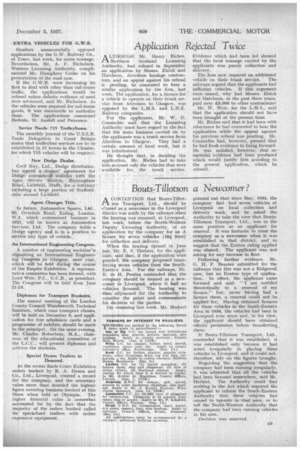Bouts-Tillotson a Newcomer?
Page 7

If you've noticed an error in this article please click here to report it so we can fix it.
A CONTENTION that Bouts-Tillot. scin Transport, Ltd., should he classed as a newcomer in the Liverpool district was made by the railways when the hearing was resumed, at Liverpool, last week, before the North-Western Deputy Licensing Authority, of an application by the company .for an A licence for seven vehicles -(18f tons) for collection and delivery.
When the hearing Opened in June last, Mr. E. S. Herbert, for the applicant, said that, if the application were granted, the company proposed transferring seven vehicles from the SouthEastern Area. For the railways, Mr. B. de H. Pereira contended that the company should be treated as a newcomer in Liverpool, where it bad no vehicles licensed. The hearing was then adjourned for the Authority to consider, the point and communicate his decision to the parties.
On resuming last week, Mr. Herbert pointed out that since May, 1934, the company bad had seven vehicles at Liverpool on local collection and delivery work, and he asked the Authority to take the view that BoutsTillotson Transport, Ltd., was in the same position as an applicant for renewal. It was fantastic to treat the company as a newcomer when it was established in that district, and to suggest that the Enston ruling applied was absurd, The applicant was not asking for any increase in fleet.
Following further evidence, Mr. G. H. P. Beames submitted for the railways that this was not a Ridgewell case, but an Enston type of applic,vtion. In effect, the applicant came forward and said: " I am entitled theoretically to a renewal of my licence," but, never having had a licence there, a renewal cOuld not be applied for: Having obtained licences for these vehicles in the South-Eastern Area in 1934, the vehicles had been in Liverpool ever since and, in his view, the applicant should have obtained official permission before tranSferring them.
If Bouts-Tillotson Transport, Ltd., contended that it was established, it was established only because it had acted irregularly in placing these vehicles in Liverpool, and it could not, therefore, rely on the figures brought..
Regarding the suggestion that the company had been running irregularly, it was admitted that all the vehicles had been licensed somewhere, said Mr, Herbert. The Authority could find nothing in the Act which required the applicant to inform the South-Eastern Authority that these veh.icles had ceased to operate in that area, or to tell the North-Western Authority that the company had been running vehicles in his area.
Decision was reserved.


































